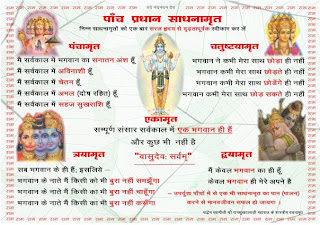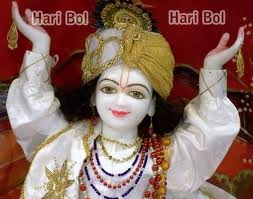(continued)
I have even asked those that are consider as great men and they said, that those that accept God as their very own, the responsibility of making Himself known is shouldered by God. The reason is only God can make Himself known, we cannot know Him. Where we are incapable, there God's capabilities come to use. This is such a great point that " I am God's and God is mine, I am not the world's and the world is not mine." You have the capability of accepting this! Whatever abilities you have, that much you must apply. That which you do not have, God will fulfill those things. "Sune ri mein ne nirbal ke bal Ram." In those aspects that you are powerless, God's power comes to play. However, in those aspects where you are able to apply your powers, and you do not apply it, then the fault is yours, the responsibility for this is not on God. You accept a few people as your own and others you do not accept as your own - why do you not apply this ability towards God? That which you are capable of doing, i.e. the extent to which God expects from you, that you must do. That which you cannot do, God does not expect that out of you. What do you hope from a little child, do you expect that he carries a heavy bag of wheat flour and brings it home? You only expect as much as he can do. Then does God lack even that much integrity? Will God tell you to please accept those things which you cannot accept? That which you can accept, atleast accept that much! That is it! This spiritual discipline that I have shared with you today, is so easy, and so straight-forward and all can do it. Whether someone is a learned and educated person, or uneducated, whether it is a brother or a sister. Whether he has good conduct or bad, whether he has good qualities or bad, whether he is a gentleman or a evil man, however a person is, all can simply accept this.
It has been said for a chaste (pativrata) wife -
Ekayi dharma ek barat nemaa |
Kaayam bachan mana pati pad prema || (Manas, Aranya. 5/10)
This is my husband, on having a firm acceptance of this, however may be the husband, she will be a chaste wife. Was Ravan a great and extra-ordinary man? However, Mandodari due to her chastity, followed her "Dharma" properly, thus she was able to get to know the greatness of Lord Ram, when Ravan, even on being told, did not listen! Where did so much knowledge come from in Mandodari? This knowledge came from "pativrata dharma". Can God say that your husband is not of good conduct, therefore you will not attain salvation? No, He cannot say so. If his conduct is not proper then what is she to do? She had abided in our "pativrata dharma" properly, then God will give it's full glories - "Binu shram naari param gati lahayi" (Manas, Aranya. 5/18). The responsibility to attain that eternal and highest state, is not on her. That responsibility lies on the scriptures, the saints and on God. She by fulfilling her "pativrata-dharma," she abided in and fulfilled the commands of the Rishis-Munis, Saints-great souls, and God; therefore they will have to give her salvation. If the husband is not capable, then how is it his fault? Mother and father got her married so Ravan became her husband. Her fault will be when she does not follow her "pativrata-dharma". Similarly "I am God's and God is mine" - this point, if you do not accept then it is your fault. But if you want to accept from within and you are unable to do so, then don't be concerned. Apply your complete strength. At the very minimum, do not accept the opposite, do not trash this point. This is an extra-ordinary point that has been shared with you.
(to be continued)
From "Bhagwaan mein Apnaapan " in Hindi by Swami Ramsukhdasji
*********************************************************
If in doubt regarding the translation, please read the original Hindi message by Swamiji.
FOR MESSAGE IN HINDI PLEASE VISIT Date : 26th January, 2012 "SUGAM SAADHAN"










